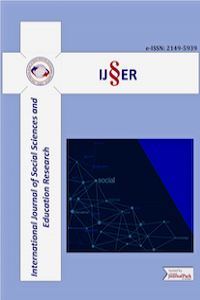Acting locally, thinking globally in social work education
___
- Bronfenbrenner, U. (2004). The Social Ecology of Human Development: A Retroperspective Conclusion, in Bronfenbrenner, U. (ed.). Making Human Beings Human: Bioecological
- Christensen, J. (2016) A Critical Reflection of Bronfenbrenner´s Development Ecology Model, Problems of Education in the 21st Century, Scientific Methodical Centre "Scientia Educologica", Lithuania; The Associated Member of Lithuanian Scientific Society, European Society for the History of Science (ESHS) and ICASE, vol. 69.
- Cousins, M. (2005) European welfare states: Comparative perspectives. London, UK: Sage
- Cox, D., Pawar, M. (2006). International Social Work: Issues, Strategies and Programs. Thousand Oak: Sage
- De Wit, H. (2002) Internationalization of Higher Education in the United States of America and Europe: A Historical, Comparative, and Conceptual Analysis. Westport, CT: Greenwood Press.
- De Wit, H. (2011). “Globalisation and Internationalisation of Higher Education” Revista de Universidad y Sociedad del Conocimiento (RUSC). Vol. 8, No 2, pp. 241-248
- Fayolle, A., Kyrö, P. (2008). The Dynamics Between Entrepreneurship, Environment and Education. London: Edward Elgar Publishing Ltd
- Granovetter, M. (1973). The Strenght of Weak ties. American Journal of Sociology. Vol. 78, No 6. Chicago: University of Chicago Press.
- Healy, L. (2008) International Social Work: Professional Action in an interdependent world. Oxford/New York: Oxford University Press
- Knight, J. (2008). Higher Education in Turmoil. The Changing World of Internationalization. Rotterdam: Sense Publishers.
- Lorenz, W. (1994). Social work in a changing Europe. London, UK: Routledge
- Meuwisse, A., Swärd, H. (2008) Cross-national comparisons of social work – a question of initial assumptions and levels of analysis. London: European Journal of Social work
- Merrill, M., Frost, C. J. (2011). Internationalizing Social Work Education: Models, Methods and Meanings. Frontiers: The Interdisciplinary Journal of Study Abroad, 21: 189-210.
- Nagy, G., Falk, D. (2000). Dilemmas in international and cross-cultural social work education. International social work nr. 43: 49-60
- Nilsson, B. (2003) Internationalization at Home from a Swedish perspective: The Case of Malmö. Journal of studies in International Education
- Polak-Egron, E., Hudson, R. (2014) Internationalization of Higher Education: Growing expectations, fundamental values, IAU 4th Global Survey
- Righard, E., (2013) Internationellt socialt arbete – Definitioner och perspektivval i historisk belysning, Socialvetenskaplig tidskrift no 2.
- Winch, P. (2012) Ecological models and multilevel interventions John Hopkins Blomberg, School of Public Health
- Other sources:
- Living and learning: Exchange studies abroad (2013), Centre for International Mobility (CIMO), Swedish Council for Higher Education and Norwegian Centre for International Cooperation in Education (SIU)
- Yayın Aralığı: Yılda 4 Sayı
- Başlangıç: 2015
- Yayıncı: Mahmut DEMİR
Spor merkezlerine üye olan bireylerin yaşam kalitesinin incelenmesi
Sevim GÜLLÜ, Ezgi Gülden ÇİFTÇİ
Türk hukuk sisteminde alternatif bir çözüm yolu olarak arabuluculuk
Yatırımcıların risk alma davranışı üzerine bir uygulama
Hatice Işın Dizdarlar, Oyku Şener
Sosyal hizmet son sınıf öğrencilerinin eğitimleriyle ilgili görüşleri ve mesleki beklentileri
Melahat Demirbilek, Safiye Özdemirhan, Mehmet Yigit, Leyla Özdemir, Hasan Yüksel, Ömer Özdemir
